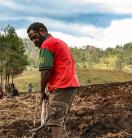Revitalising soil Information in Papua New Guinea
A new ACIAR-funded agriculture research project between Australia and Papua New Guinea (PNG) is set to revitalise soil information and boost sustainable food production.
First established in 1981, the PNG Resource Information System (PNGRIS) served as a database that mapped out the country’s natural resources and population information. It was developed to help PNG manage land use, particularly for food and cash crop production.
Project Leader and CSIRO National Soil Information Manager, Mr Peter Wilson, said over time PNGRIS has been overlooked, leading to poor data quality and difficulty in accessing information for development planning.
‘Research will aim to improve PNG’s capacity to collect accurate soil and land information using the most current technology,’ said Mr Wilson.
‘This vital information will be fed into PNGRIS and made available to the PNG Government, researchers, industry and the public to support and enhance agricultural planning, development and land management in PNG.’
The new A$2.8 million project will also ensure scientific and research capacity is built to undertake modern soil sampling and analysis and ensure improved agricultural extension services through better access to soil and land information.
Mr Wilson said smallholder farmers will also be able to access information that can help inform them about land use and management and soil degradation risks.
ACIAR Soil and Land Management Research Program Manager, Dr James Quilty, said land use planning, informed by accurate, current and accessible information is vital for the sustainability of PNG’s agrifood systems.
‘Increases in population, climate change, unsustainable land management practices, intensification of farming systems and over-exploited resources are degrading the land, impacting soil security and depleting nutrients,’ said Dr Quilty.
‘This project aims to enable integrated decision making among stakeholders and improve livelihoods through better informed and more efficient agricultural and natural resource management practices, while working towards achieving sustainability, through improved efficiency of resource use.
‘This will be achieved through improving PNG’s capability to undertake Land Use Planning (LUP) utilising timely, reliable and appropriate information, which will ensure land is allocated for economic and social development in a sustainable and transparent manner, while safeguarding the environment.’
Utilising existing data the project will initially focus on case studies in coffee, forestry and integrated agricultural planning to assess the need, role and benefits of soil and land information in Morobe Province. Following on from the initial work the project will then build capacity and utilise modern analytical methods to improve data resolution and quality within these three case studies to improve the value of information in decision making among stakeholders.
A significant outcome of the project will include building the capacity of Papua New Guineans to use, maintain and further develop PNGRIS, beyond the end of the project.
The 4-year project is funded through the ACIAR Soil and Land Management Research Program and is a collaboration between CSIRO and PNG stakeholders including the Department of Agricultural and Livestock, Coffee Industry Corporation, National Agriculture Research Institute, Forestry Research Institute, Grow PNG and the University of Technology.



